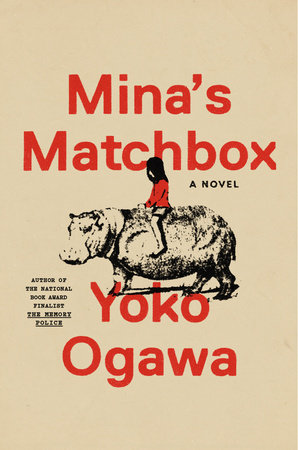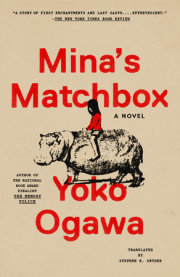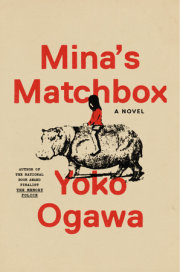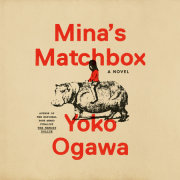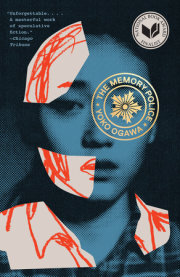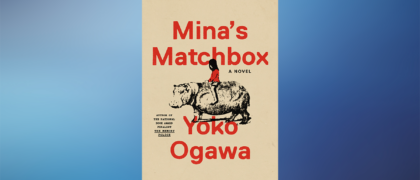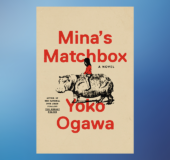Named a Best Book of the Year by TIME, NPR, The New Yorker, Vanity Fair, Christian Science Monitor, Words Without Borders, and BookPage
A New York Times Book Review Editors’ Choice
A Most Anticipated Book of the Summer from People, The Atlantic, TIME, Boston Globe, Bustle, and Publishers Weekly
A Best Book of August from the Christian Science Monitor
A Best New Book of the Week from Parade
“A story of first enchantments and last gasps…Effervescent…’We look at the world once, in childhood,’ Louise Glück wrote in her 1996 poem ‘Nostos.’ ‘The rest is memory.’ Ogawa captures the enduring spark of that imprinting and its oracular glow. We revisit those moments when the match was first struck, when the future still felt like ours to ignite.”
—New York Times Book Review
"Ogawa evokes the secret crushes and crushing secrets of girlhood with charm and elegance."
—People
"There’s such an elegance to the way Mina’s Matchbox unfolds...The world Yoko Ogawa builds is quiet, warm and it should feel comforting. But there are peculiarities about the whole thing that keep you on the tips of your toes."
—NPR
“Beguiling…The book is suffused with the transplant’s growing awareness of the ephemerality of her own innocence.”
—The New Yorker
"This elegant, unusual novel full of eccentric personages is a Wes Anderson movie waiting to happen...A magical adventure."
—Oprah Daily
“A bittersweet coming-of-age tale…Dreamy and whimsical, Mina’s Matchbox traffics in the themes at which Ogawa always excels: memory, identity, and nostalgia.”
—Esquire
"A magnificent translation...A lovely epistolary epilogue allows readers to close the book contented that Mina’s Matchbox is almost a fairy tale. Its moral? Childish curiosity is as fleeting as the flame of a beautifully struck match—capture it before it’s gone and you can kindle a lifetime love of learning."
—Minneapolis Star-Tribune
"One of the literary events of the year."
—Parade
“The reader is immersed in [Tomoko’s] ardent love for her fragile cousin, and comes to appreciate how history seeps into every life, even the most sheltered ones.”
—The Atlantic
“A conspicuously gifted writer…To read Ogawa is to enter a dreamlike state... She possesses an effortless, glassy, eerie brilliance.”
—The Guardian
“A transfixing coming of age tale.”
—TIME
“Capturing a Japanese girl’s adolescence in the early 1970s, this hypnotic book shimmers with eccentric enigmas.”
—Boston Globe
“Unfurls like a dazzling and mysterious dream…In Stephen Snyder’s elegant translation, the tone is whimsical but never syrupy…Beautifully composed…Ogawa has turned a deceptively simple account of a year spent with exotic relatives into something closer to a universal fable about the precarious wonder of growing up.”
—Financial Times
“The entire novel reads with an especially personal and poignant atmosphere of nostalgia. The setting is lovingly-rendered…A truly beautiful coming-of-age novel written from a mature adult’s perspective…The narrative reads like Harper Lee’s To Kill a Mockingbird, with Tomoko standing in for Scout Finch to Mina’s Jem…As always, the work of translator Stephen Snyder is excellent…Like a sepia-toned photograph beginning to curl at the edges, Yoko Ogawa’s Mina’s Matchbox is a wistful story of the blink-and-you-miss-it moment between childhood and adulthood set at an important but easily-overlooked moment in Japanese history. It’s also a gorgeous reminder for any reader of those great lessons of adolescence. Family is complicated. Beauty is not always simple. And the days left behind are never coming back.”
—Asian Review of Books
"Gemlike...Ogawa’s storytelling is radiant."
—Christian Science Monitor
“Moving…A gentle reminder of how to live and how and why we harken back to what has been. As Yoko Ogawa—helped immeasurably by Stephen Snyder’s tender translation—has Tomoko come to understand, ‘Even when you die, you don’t disappear. Matter doesn’t vanish, it transforms.’”
—The Anniston Star
“Equal parts whimsical and haunting…Much of the book unfolds as a series of small mysteries like this, rendering a coming-of-age tale utterly engrossing. Somehow Ogawa’s book, translated by Stephen Snyder, captures both the petty concerns of adolescence and also the allure, and horrors, of the wider world.”
—Foreign Policy
“Haunting…The clever Ogawa, whose previous work The Memory Police drew wide acclaim in the literary world, has woven together a number of strands in her bold new effort…Mina’s Matchbox attains something like the eloquent sadness of Philip Larkin’s 1947 novel A Girl in Winter, another story of dashed dreams. But a more useful analog may be a short poem by the twelfth-century Japanese courtier Fujiwara No Kiyosuke, which Kenneth Rexroth translated into English and included in his One Hundred Poems From the Japanese: ‘I may live on until / I long for the time / In which I am so unhappy, / And remember it fondly.’…[Ogawa’s] social commentary is as astute as her writing is elegant and vivid.”
—Book and Film Globe
“Ogawa’s latest is steeped slowly in a sense of quiet and innocent adventure, beautifully written.”
—NW Theatre
“Yoko Ogawa is a quiet wizard, casting her words like a spell, conjuring a world of curiosity and enchantment, secrets and loss. I read Mina’s Matchbox like a besotted child, enraptured, never wanting it to end.”
—Ruth Ozeki, author of The Book of Form and Emptiness
“Elegant…A playground for Ogawa’s interest in particular details…Mina’s Matchbox feels more familiar in the tradition of Latin American magical realism, especially Isabel Allende’s The House of the Spirits and Gabriel Garcia Marquez’s 100 Years of Solitude, with its enigmatic family lore and the rich, sophisticated practices of a fallen era…Intimate…[The novel] sparks the imagination toward faraway places.”
—The Japan Times
"Hypnotic, introspective."
—Daily Kos
“It’s the kind of transformative trip that makes for a powerful read at any time of year, but feels especially appropriate when you’re craving a (literary) summer sojourn.”
—Bustle
“An incredible novel that affirms Ogawa’s position as the great writer of fantastical literature today…Brighter in tone and detail…but somehow the tension and terror of living is always at the periphery. Ogawa has produced a world near and tender, but tough and bittersweet, like recognizing a lost loved one in the story told by someone new.”
—The Millions
“I just loved it. It’s an absolute delight of a book…A jewel-box of a novel. It’s wonderful.”
—Suzanna Hermans of Oblong Books on WAMC
"A delicate domestic novel...A quiet novel to savor!"
—Historical Novel Society
“Magnificently wrought…It is written in precious, tender prose yet maintains the reserved voice of an author who understands the need to keep certain things private…The beauty in Ogawa’s writing is her willingness not to answer our questions but rather keep them swirling about…Ogawa already knows the clandestine power magic moments can hold for us, if we are courageous enough to surrender to them.”
—World Literature Today
"Powerful in its nuanced details, Mina’s Matchbox is an immersive and poignant coming-of-age story...Curious and filled with wonder...Ogawa’s masterful descriptions, too, add depth and suggest simmering secrets that wait to boil over...An elegant and stirring work that captures the dreams of youth, and the lingering sweetness that can remain even after those dreams have faded."
—Bookpage, starred review
“Focusing on characters of an age when the world seems full of wonder and possibility, this engaging bildungsroman explores the friendship and mutual curiosity between two extraordinary young people… Facing complicated themes with deceptively simple language, she pulls off a neat trick here, painting everything in miniature and often in hindsight without losing the immediacy of Tomoko’s experiences. A charming yet guileless exploration of childhood’s ephemeral pleasures and reflexive poignancy.”
—Kirkus, starred review
“Captivating…Ogawa pulls off the rare feat of making childhood memories both credible and provocative. Readers will be hypnotized.”
—Publishers Weekly, starred review
“In language as clean and delicate as a whisper, the cousins’ year of shared adventures frays as tragedies chip away at the public façade of the family’s private realities…Ogawa writes with exquisite artistry about the complications of a close-knit household whose members are quietly protective of its wounding secrets, as seen through the eyes of a young girl; the novel is beautifully translated by Snyder.”
—Library Journal, starred review
“[12-year-old] Tomoko proves to be a prodigiously astute observer, discovering truths behind closed doors…Remarkable is the timing of Snyder’s impressively seamless translation. Ogawa already brilliantly, deftly broadens her not-quite-quotidian family saga with pivotal world events.”
—Booklist, starred review

